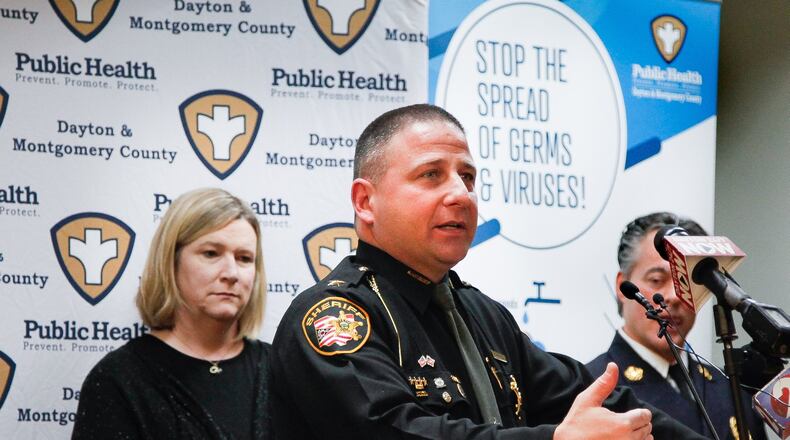Coronavirus: Complete coverage
Cooper said he did not know the condition of the Montgomery County patient hospitalized nor the ages or gender of the other six confirmed positive with COVID-19 or in which communities they reside.
COVID-19 had taken the lives of at least three Ohioans as of Sunday afternoon, the Ohio Department of Health confirmed. Confirmed cases numbered 351 across 40 counties. Other area counties with confirmed cases include: Butler, 17; Clark, 1; Clinton, 1; Darke, 1; Miami, 13; Warren, 3.
Ohio Gov. Mike DeWine announced on Sunday the stay-at-home order that will go into effect Monday night at 11:59 p.m. It will be in effect until April 6.
“This is not a suggestion, this is an order,” he said.
RELATED: Coronavirus stay-at-home order: What businesses are considered essential?
But the order allows for common-sense exceptions for essential workers and gives citizens the ability to get out for medicine and food, as well as exercise.
Montgomery County Sheriff Rob Streck said while the order doesn’t prevent people from providing for themselves or their families, people need to eliminate nonessential travel and contact with others.
“We can go to the store, we can go out for a walk,” he said. “We can do all of that we can check with our neighbors, we can check with our loved ones. We are not turning this into a police state,” he said. “But it’s time to be responsible.”
Dayton police Chief Richard Biehl said more guidance on the state’s order will be given to officers on Monday. The 23-page document indicates a person not complying with the order could be charged with misconduct in an emergency under the Ohio code, but that won’t be the department’s first step. Biehl said.
“We will be seeking and looking for voluntary compliance,” he said.
Streck said families bound in tight quarters might need to take a break from each other to keep tensions from running high.
“You’re allowed to leave your house. you’re allowed going outside for a walk, you’re allowed going out to the garage. Separate, give yourself some alone time and get through it,” Streck said. “There’s no reason to panic … Remember, love your family, love your neighbors, love your friends, check on each other.”
If people don’t follow the state order, conditions could become more prohibitive, said Kettering police Chief Chip Protsman.
“Please use common sense. Nobody likes this order, or the restrictive lifestyles that we have right now,” Protsman said. “Everybody needs to understand that if we don’t follow this, that it’s going to become more restrictive, and nobody wants that.”
MORE: Severe weather will not take break for coronavirus
Most people are already voluntarily complying with the health guidance, said Dayton Mayor Nan Whaley. But the city has received worrisome calls about house parties, banned under the new state order, which could allow for a surge of new cases, she said.
“I know it’s difficult. Some people want to have game nights with their friends. Do not do that,” Whaley said. “Flattening that curve will absolutely save Daytonians’ lives.”
About the Author

